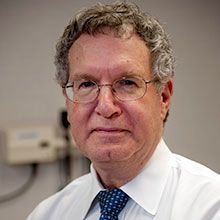
Infectious diseases physician, talented educator, and brilliant researcher Fred M. Gordin, MD, passed away on March 18, 2018 at age 66 after a four-year battle with lung cancer. He is survived by his beloved wife, Anne Willoughby, MD; his son Jonathan, a cardiologist at UCLA; and his daughter Dana, a graduate student at the University of Michigan. Dr. Gordin was a leader in groundbreaking research that led to improved care of persons living with HIV infection and those with tuberculosis, in the United States and around the world. Dr. Gordin also had an indelible impact on his patients, his colleagues, community advocates, students, and the wider infectious diseases community.
Dr. Gordin received his undergraduate degree in mathematics from the University of Michigan and earned his doctor of medicine from Weill Cornell Medical College. He completed his residency in internal medicine at Georgetown University and his fellowship in infectious diseases at the University of California, San Francisco (UCSF) just as the HIV pandemic was erupting.
He returned to Washington, DC in 1984 and began his long and successful career at the Veterans Affairs Medical Center, where, in 1987, he became Chief of the Infectious Diseases Section. Over the next three decades, Dr. Gordin became a leader in the fight against HIV and tuberculosis, both locally and globally. He helped establish the first VA Cooperative Studies trial of HIV treatment and helped to establish the Community Programs for Clinical Research on AIDS (CPCRA), a 17-year, multi-million dollar, federally- funded clinical trials network ¾ designed to promote and conduct HIV research within local communities, focusing on the treatment of HIV disease and on the prevention and treatment of its complications. The CPCRA network recruited demographically, geographically, and socio-economically diverse populations of individuals infected with HIV or at risk of infection in close collaboration with community members who were themselves infected with or affected by HIV.
Dr. Gordin was also one of five international investigators who founded the NIH-funded INSIGHT network in 2006 and launched the SMART and START global trials, cited by Anthony Fauci, Director of the National Institute of Allergy and Infectious Diseases, as two of “a ‘trifecta’ of pivotal Antiretroviral Therapy (ART) studies” that have had global impact on HIV treatment guidelines. In 2007, Dr. Gordin became the Principal Investigator of the Terry Beirn CPCRA Clinical Trials Unit, with affiliated sites participating in the NIH-funded AIDS Clinical Trials Group (ACTG) and HIV Prevention Trials networks (HPTN).
Since the mid-1990s, Dr. Gordin was a leading investigator in the CDC-funded Tuberculosis Trials Consortium (TBTC), an international clinical trials group devoted to improving tuberculosis treatment. In 2012, the Prevent TB Study team received the Charles C. Shepard Science Award in the Prevention and Control category for his New England Journal of Medicine article titled “Three Months of Rifapentine and Isoniazid for Latent Tuberculosis Infection.” The study found that using rifapentine with isoniazid once weekly for a three-month period was just as effective as using the previous standard of nine months of daily isoniazid alone in preventing tuberculosis and had a higher treatment completion rate. In 2014, Dr. Gordin received a Centers for Disease Control and Prevention Award of Honor for his 25 years of significant contributions to tuberculosis research and to the TB Trials Consortium.
Dr. Gordin was Professor of Medicine at the George Washington University (GW) School of Medicine and Health Sciences. He trained and mentored hundreds of medical students, residents, and infectious disease fellows. He was a senior scientist in the Clinical and Population Sciences Core of the District of Columbia Center for AIDS Research at GW.
Dr. Gordin’s research and expertise also included Infection Control. As hospital epidemiologist, he thoroughly investigated infectious risks for patients and healthcare workers and endeavored tirelessly to reduce nosocomial infections within the VA Medical Center.
He published more than 140 scientific papers in infectious diseases and was elected a Master of the American College of Physicians in 2014.
Though described as “A Giant,” he connected deeply on a personal level, advocating for the communities living with HIV infection, those with tuberculosis. He was a great champion of community engagement and promoted the voices of community members as partners in clinical care and medical research.
Colleagues in the scientific community describe him as a visionary, often ahead of the scientific curve while exercising calm, courageous and steadfast leadership and never losing sight of the big picture. He was often the person in a meeting who would give voice to the thoughts that others were thinking but were reluctant to say. He was able to provide that important clarity to his fellow researchers, clinicians and patients. He celebrated life and the importance of joy and humor in the day to day and effectively demonstrated that in the clinic, his workplace and home.
Dr. Gordin leaves a remarkable legacy in each of the communities that he has touched.


